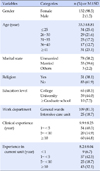Abstract
Purpose
The local public hospitals in Korea are regarded as institutions that must consider the provision of good quality public health services, as well as profitability. Therefore it is important to improve nursing services to produce positive change in local public hospitals. This study was done to examine the relationships between self efficacy, organizational commitment, customer orientation and nursing performance for nurses in local public hospitals.
Methods
For this study, 5 of 34 institutions were selected through random sampling: and 134 nurses working in local public hospitals were selected. Data were collected from March 28 to April 8, 2016 using self-report questionnaires. Collected data were analyzed using independent t-test, one-way ANOVA, Scheffé test, Pearson correlation coefficient and multiple regression with SPSS/WIN 18.0.
Results
The major findings are summarized as follows: (1) There were significant positive correlations between self efficacy, organizational commitment, customer orientation, and nursing performance. (2) The factors affecting nursing performance were self efficacy, organizational commitment, and customer orientation, in that order, and these variables explained 57% of nursing performance.
Figures and Tables
Table 2
Level of Self Efficacy, Organizational Commitment, Customer Orientation and Nursing Performance (N=134)

Table 3
Difference in Self Efficacy, Organizational Commitment, Customer Orientation and Nursing Performance according to General Characteristics (N=134)

References
1. Ministry of Health and Welfare. (KR). Act on the establishment and management of local medical centers. Partial amendment. Act No. 14008. 2016. 02. 03.
2. Ministry of Health and Welfare. Local medical centers' management has improved [Internet]. Sejong: Ministry of Health and Welfare;updated 2016 June 21. cited 2016 July 18. Available from: http://www.mohw.go.kr/front_new/al/sal0301vw.jsp?PAR_MENU_ID=04&MENU_ID=0403&CONT_SEQ=332896&page=1.
3. Nam KH, Park JH. A Study on the relationship of empowerment with job satisfaction and organizational commitment perceived by nurses. J Korean Acad Nurs Adm. 2002; 8(1):137–150.
4. Ha NS, Choi J. An analysis of nursing competency affecting on job satisfaction and nursing performance among clinical nurses. J Korean Nurs Adm Acad Soc. 2010; 16(3):286–294.
5. Park SA. An exploratory study on the relationship between leadership style and performance in Korean nursing units. Seoul J Nurs. 1990; 4(1):45–61.
6. Bandura A. Social foundations of thought and action: A social cognitive theory. Englewood Cliffs, N.J.: Prentice-Hall;1986. p. 617.
7. Bandura A. Self-efficacy: Toward a unifying theory of behavioral change. Psychol Rev. 1977; 84(2):191–215. DOI: 10.1037//0033-295x.84.2.191.
8. Bandura A. Self-efficacy: The exercise of control. New York: W.H. Freeman;1997. p. 604.
9. Bong YS, So HS, You HS. A study on the relationship between job stress, self-efficacy and job satisfaction in nurses. J Korean Nurs Adm Acad Soc. 2009; 15(3):425–433.
10. Song AR. The effects of clinical nurse's internal marketing on self-efficacy and task performance. J KOHVEA. 2010; 11(4):293–301.
11. Beecroft PC, Dorey F, Wenten M. Turnover intention in new graduated nurses: A multivariate analysis. J Adv Nurs. 2008; 62(1):41–52. DOI: 10.1111/j.1365-2648.2007.04570.x.
12. Mowday RT, Steers RM, Porter LW. The measurement of organizational commitment. J Vocat Behav. 1979; 14(2):224–247. DOI: 10.1016/0001-8791(79)90072-1.
13. Daniel K, Darby DN. A dual perspective of customer orientation: A modification, extension and application of the SOCO scale. Int J Serv Ind Manag. 1997; 8(2):131–147. DOI: 10.1108/09564239710166254.
14. Parasuraman A, Zeithaml VA, Berry LL. SERVQUAL: A multiple-item scale for measure consumer perceptions of service quality. J Retail. 1988; 64(1):12–40.
15. Kim IS, Seo RB, Kim BN, Min AR. The effects of positive psychological capital, organizational commitment, customer orientation in clinical nurses. J Korean Nurs Adm Acad Soc. 2015; 21(1):10–19. DOI: 10.11111/jkana.2015.21.1.10.
16. Yeo AR, Lee H, Jin H. Factors associated with customer orientation and nursing productivity. J Korean Acad Nurs Adm. 2014; 20(2):167–175. DOI: 10.11111/jkana.2014.20.2.167.
17. Lee W, Uhm JY, Lee T. Role transition of senior year nursing students: Analysis of predictors for role transition. J Korean Acad Nurs Adm. 2014; 20(2):187–194. DOI: 10.11111/jkana.2014.20.2.187.
18. Scherer M, Maddux JE, Mercandante B, Prentice-Dunn S, Jacobs B, Rogers RW. The self efficacy scale: Construction & validation. Psychol Rep. 1982; 51(2):663–671. DOI: 10.2466/pr0.1982.51.2.663.
19. Jung AS. A study on the relations between a health promoting behaviors and self-efficacy in general hospital nurse [master's thesis]. Seoul: Hanyang University;2007. 1–68.
20. Chang KW. Study on structural modeling of organizational citizenship behaviors for nurses [dissertation]. Seoul: Kyung Hee University;2010. 1–82.
21. Cho KJ. The effects of organizational culture and leadership style on the organizational effectiveness and customer-oriented behavior in the nursing department of a university hospital [master's thesis]. Seoul: Yonsei University;2006.
22. Han AL, Kwon S. Effects of self-leadership and self-efficacy on nursing performance of nurses working in long-term care hospitals. J Korean Gerontol Nurs. 2016; 18(1):12–21. DOI: 10.17079/jkgn.2016.18.1.12.
23. Joo YS, Han SS. The effects of leader's emotional intelligence and nurse's own emotional intelligence on organizational commitment and organizational citizenship behavior. J Korean Acad Soc Nurs Educ. 2013; 19(1):194–202. DOI: 10.5977/jkasne.2013.19.2.194.
24. Do ES, Kim MY. Comparison of internal marketing, job satisfaction and customer orientation of nurses by size of medical care institution; small-medium hospitals and general hospitals. J Korean Nurs Adm Acad Soc. 2012; 18(1):56–66. DOI: 10.11111/jkana.2012.18.1.56.
25. Kim YH, Cho GY, Kim MS. Canonical correlation among clinical decision making, self-efficacy and nursing performance. J Korean Data Anal Soc. 2015; 17(5):2767–2778.
26. Bellou V. The role of learning and customer orientation for delivering service quality to patients. J Health Organ Manag. 2010; 24(4):383–395. DOI: 10.1108/14777261011064995.
27. Lee TW, Ko YK. Effects of self-efficacy, affectivity and collective efficacy on nursing performance of hospital nurses. J Adv Nurs. 2010; 66(4):839–848. DOI: 10.1111/j.1365-2648.2009.05244.x.




 PDF
PDF ePub
ePub Citation
Citation Print
Print





 XML Download
XML Download